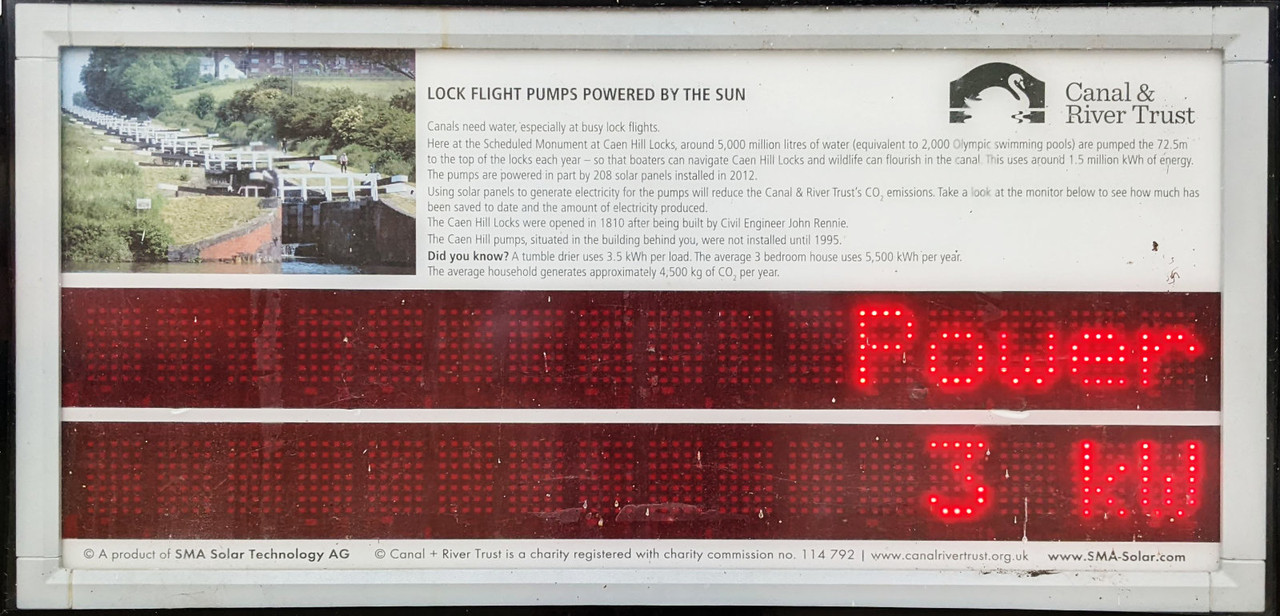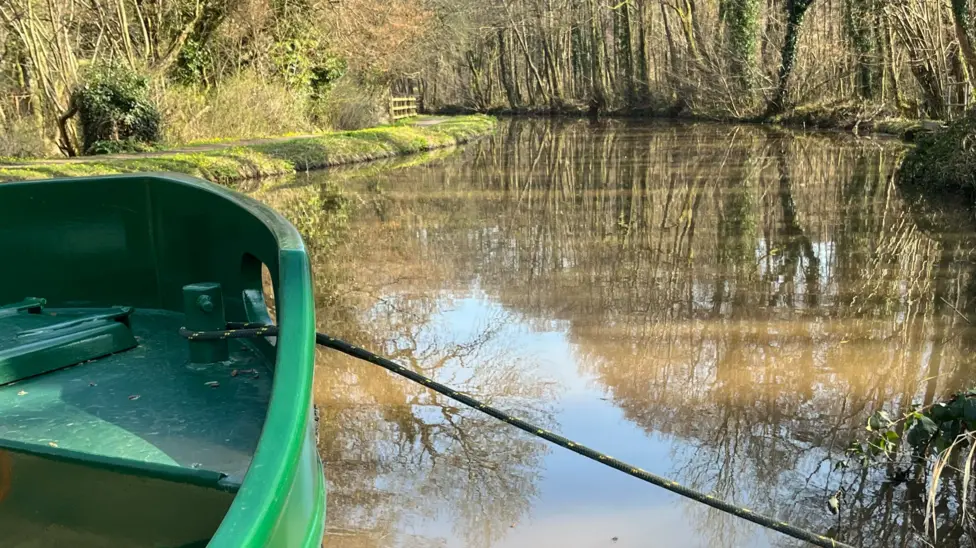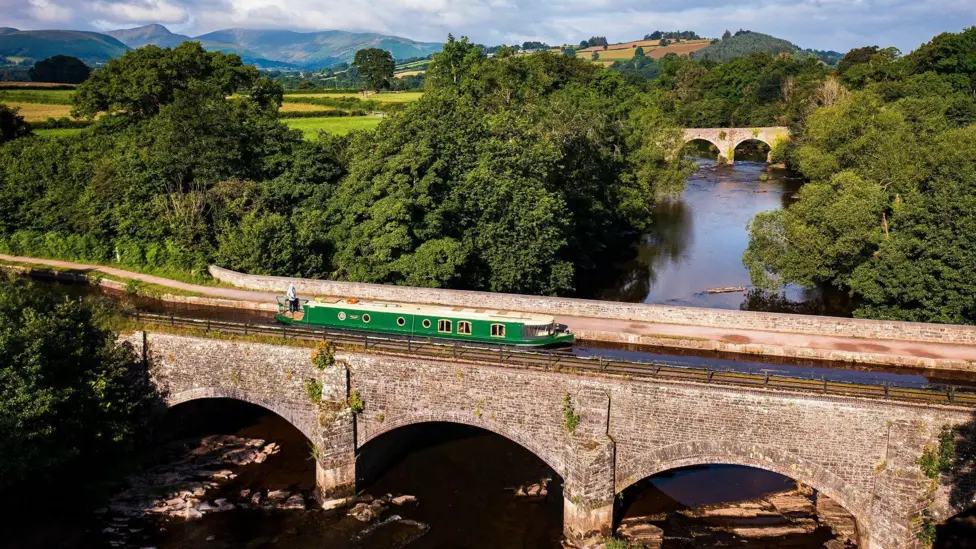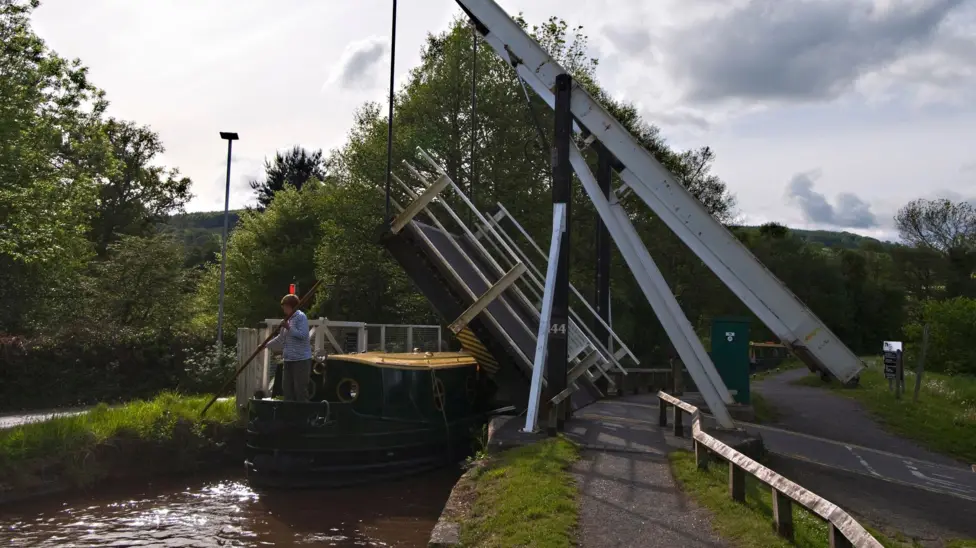| Re: Monmouthshire and Brecon Canal - water shortage, March 2025 Posted by Mark A at 11:08, 5th December 2025 |     |
Funding sourced to secure the water supply for the Mon & Brec canal.
https://www.bbc.co.uk/news/articles/c1e46xz0191o
I need to eat worms on my previous understanding of this as the west side of the country's rainfall this year was... anomalous. It's very positive that support has been found for the canal but the underlying issue can only be mitigated to some extent by funding - underlying this is the spectre of drought, and drought is something that causes an itch in the frogs of the the hooves of the horses of the four horsemen of the apocalypse.
Mark
| Re: Monmouthshire and Brecon Canal - water shortage, March 2025 Posted by Mark A at 11:00, 6th April 2025 |     |
Each time that a lock is used, water runs down hill, and a continual supply of new water is therefore needed to the upper reaches of the canal.
Could some of this water not be re-used ? It should be relatively simple to install a pipeline along the canal so as to pump some water from the bottom of the canal to the pound or reservoir at the top. There is no need to return ALL the water to the top, just enough to avoid shortages.
Either use off peak grid power for this pumping, and pump only in the off peak hours at a much reduced cost, or alternatively power the pumps from an array of PV modules installed for the purpose, and pump only during hours of sunlight.
Could some of this water not be re-used ? It should be relatively simple to install a pipeline along the canal so as to pump some water from the bottom of the canal to the pound or reservoir at the top. There is no need to return ALL the water to the top, just enough to avoid shortages.
Either use off peak grid power for this pumping, and pump only in the off peak hours at a much reduced cost, or alternatively power the pumps from an array of PV modules installed for the purpose, and pump only during hours of sunlight.
Backpumping is common practise on many canals - and only needs to run past the locks and not all along the canal. It's a necessity these days on many canals where boat numbers are far in excess of what they were at the peak of commercial calls use. Not sure whether the Mon and Brec has backpumps.
Also to consider - evaporation and leakage where water is lost off the top into the air and under the bottom into the earth. Not sure at what level this happens / how significant it is - it has certainly been critical in places like between Dundas and Avoncliff in the past.
The K&A is (now) the posterchild of back-pumping. The Devizes flight has a part solar-powered installation, here's its information board with some useful figures. Backpumping remains expensive though. Solar, that day, was not doing too much heavy lifting at that moment as this was the end of a damp morning albeit in August - and 2025 panels might well be more efficient than the 2012 variety.
I'm not sure how the K&A backpumping compensates for its long pounds - which the canal engineers typically laid out with a small gradient along their length to reflect the fact that the water they held would need to move between lock flights and its surface would therefore not be level but have a slight downhill gradient. Reverse the flow and the gradient needs to swap ends...
Evaporation plagued certain canals - think it was the Thames and Severn canal's management was concerned that its thirsty summit lost water any way it could, including by evaporation and did they attempt to tackle this by planting (thirsty) trees to provide shade and relief from drying winds?
Mark

| Re: Monmouthshire and Brecon Canal - water shortage, March 2025 Posted by grahame at 10:38, 6th April 2025 |     |
This looks to be a manufactured crisis caused by changes in legislation.
I would agree - so strongly that I'm writing to say so and not just hitting LIKE.
| Re: Monmouthshire and Brecon Canal - water shortage, March 2025 Posted by Mark A at 10:30, 6th April 2025 |     |
A useful read on the link below, with some of the background. Still not sure how this has suddenly become a crisis for the Canal and River Trust. Presumably the canal's intake is measured, it would be interesting to know the figures.
As an aside, concerning the canal, there are hopefully some engrossing** legal documents in some archive or other.
Mark
** For certain very specific definitions of 'Engrossing'.
https://wyeuskfoundation.org/our-work/usk-and-wye-abstraction-group/
| Re: Monmouthshire and Brecon Canal - water shortage, March 2025 Posted by Mark A at 09:04, 6th April 2025 |     |
On the link, the gauge at Brecon Weir. Water levels are 12 centimetres off the lowest ever recorded (data goes back to 2018) but this measures levels not flow, you can change settings to display the last 12 months of data and the river is a little below the height to which it trended in the last twelve months, 2024 was not a dry year.
This gauge is just above the weir so this better indicates the river level rather than the volume of water over the weir - to maintain the height of five inches above the weir cill the flow will not be trivial. The smaller size of the canal feeder will mask any fall and rise resulting from the canal abstracting water as the lock a couple of miles downstream draws water.
This looks to be a manufactured crisis caused by changes in legislation. Local easements should be applied and the Canal and River Trust should have the money they've paid returned to their maintenance budget where it is needed for the safety of all.
Mark
https://rivers-and-seas.naturalresources.wales/Station/4286?parameterType=1
| Re: Monmouthshire and Brecon Canal - water shortage, March 2025 Posted by grahame at 07:20, 6th April 2025 |     |
Each time that a lock is used, water runs down hill, and a continual supply of new water is therefore needed to the upper reaches of the canal.
Could some of this water not be re-used ? It should be relatively simple to install a pipeline along the canal so as to pump some water from the bottom of the canal to the pound or reservoir at the top. There is no need to return ALL the water to the top, just enough to avoid shortages.
Either use off peak grid power for this pumping, and pump only in the off peak hours at a much reduced cost, or alternatively power the pumps from an array of PV modules installed for the purpose, and pump only during hours of sunlight.
Could some of this water not be re-used ? It should be relatively simple to install a pipeline along the canal so as to pump some water from the bottom of the canal to the pound or reservoir at the top. There is no need to return ALL the water to the top, just enough to avoid shortages.
Either use off peak grid power for this pumping, and pump only in the off peak hours at a much reduced cost, or alternatively power the pumps from an array of PV modules installed for the purpose, and pump only during hours of sunlight.
Backpumping is common practise on many canals - and only needs to run past the locks and not all along the canal. It's a necessity these days on many canals where boat numbers are far in excess of what they were at the peak of commercial calls use. Not sure whether the Mon and Brec has backpumps.
Also to consider - evaporation and leakage where water is lost off the top into the air and under the bottom into the earth. Not sure at what level this happens / how significant it is - it has certainly been critical in places like between Dundas and Avoncliff in the past.
| Re: Monmouthshire and Brecon Canal - water shortage, March 2025 Posted by broadgage at 04:08, 6th April 2025 |     |
Each time that a lock is used, water runs down hill, and a continual supply of new water is therefore needed to the upper reaches of the canal.
Could some of this water not be re-used ? It should be relatively simple to install a pipeline along the canal so as to pump some water from the bottom of the canal to the pound or reservoir at the top. There is no need to return ALL the water to the top, just enough to avoid shortages.
Either use off peak grid power for this pumping, and pump only in the off peak hours at a much reduced cost, or alternatively power the pumps from an array of PV modules installed for the purpose, and pump only during hours of sunlight.
| Re: Monmouthshire and Brecon Canal - water shortage, March 2025 Posted by Chris from Nailsea at 17:39, 5th April 2025 |     |
An update, from the BBC:
Emergency water supply for at-risk canal costing £100k a week

An historic canal will be given an emergency water supply to stop it from running dry in days.
The Canal and River Trust, which runs the Monmouthshire and Brecon Canal, has used money which was earmarked for repairs to buy a short-term supply from Welsh Water. But the charity said this was a "stop gap" and it could not continue "to shoulder the full financial burden" because, if recent dry weather continued, it could cost up to £100,000 a week to remedy.
Welsh Water said it was pleased the agreement did not incur costs for customers or risk drinking water. Water will start being taken from the Usk Reservoir between Brecon and Llandovery from the early hours of Saturday.
The charity said the cost would vary depending on rainfall and therefore river levels, but warned if current conditions persist, "it's likely we'll be paying as much as £100,000 per week". It said it had diverted money away from planned maintenance and repairs to secure "a stop gap water supply". It added this would have consequences for the its programme of maintenance and was therefore a "risk" for the England and Wales canal network.
The difficulties facing the canal were first outlined in a letter sent to local businesses by Glandŵr Cymru, the Canal and River Trust in Wales, in February. It explained the 225-year old canal, which once transported iron and coal to Newport docks, had relied on funnelling water from the River Usk and its tributaries, which accounted for between 80% and 90% of its water supply.
Recent changes in legislation, designed in part to protect rivers in the face of climate change, mean licences are now required, restricting the amount of water that can be taken. Now, the charity fears the dry start to 2025 means the canal could run start to run dry in days without imminent rainfall.
A petition in the Senedd, calling on the Welsh government to help preserve the canal, has obtained more than 10,000 signatures.
(Article continues)

An historic canal will be given an emergency water supply to stop it from running dry in days.
The Canal and River Trust, which runs the Monmouthshire and Brecon Canal, has used money which was earmarked for repairs to buy a short-term supply from Welsh Water. But the charity said this was a "stop gap" and it could not continue "to shoulder the full financial burden" because, if recent dry weather continued, it could cost up to £100,000 a week to remedy.
Welsh Water said it was pleased the agreement did not incur costs for customers or risk drinking water. Water will start being taken from the Usk Reservoir between Brecon and Llandovery from the early hours of Saturday.
The charity said the cost would vary depending on rainfall and therefore river levels, but warned if current conditions persist, "it's likely we'll be paying as much as £100,000 per week". It said it had diverted money away from planned maintenance and repairs to secure "a stop gap water supply". It added this would have consequences for the its programme of maintenance and was therefore a "risk" for the England and Wales canal network.
The difficulties facing the canal were first outlined in a letter sent to local businesses by Glandŵr Cymru, the Canal and River Trust in Wales, in February. It explained the 225-year old canal, which once transported iron and coal to Newport docks, had relied on funnelling water from the River Usk and its tributaries, which accounted for between 80% and 90% of its water supply.
Recent changes in legislation, designed in part to protect rivers in the face of climate change, mean licences are now required, restricting the amount of water that can be taken. Now, the charity fears the dry start to 2025 means the canal could run start to run dry in days without imminent rainfall.
A petition in the Senedd, calling on the Welsh government to help preserve the canal, has obtained more than 10,000 signatures.
(Article continues)
| Re: Monmouthshire and Brecon Canal - water shortage, March 2025 Posted by Mark A at 15:55, 27th March 2025 |     |
Does this have the makings of being an artificially created and thoroughly nineteenth century crisis? It's as if some organisation's identified an income stream up for grabs.
Water levels on the Usk at Brecon for the year to March '25 to be found on the link below. The levels will be slightly representative of the flow and it would be useful to know the extent to which the canal's put a dent in *that*. Even though leisure use of canals results in the demands on their water supply peaking during the dry months, I'd not expect the locks of the Mon and Brec to be exactly thrashed whether in summer or any other season.
Mark
https://rivers-and-seas.naturalresources.wales/Station/4286?parameterType=1
| Monmouthshire and Brecon Canal - water shortage, March 2025 Posted by Chris from Nailsea at 13:23, 27th March 2025 |     |
From the BBC:
Fears 19th Century canal could start to run dry in days

There are fears one of Wales' most popular canals could start to dry up within a week, prompting calls for the Welsh government to intervene.
Operators of the 225-year-old Monmouthshire and Brecon Canal have warned of an "urgent" water shortage without the prospect of imminent rainfall. It comes amid debate over how the historic attraction should secure its water supply in future after limits were placed on taking water from the environmentally sensitive River Usk.
The Welsh government said any arrangement between the Canal & River Trust and Welsh Water would be a commercial decision in which it should play no role.
The 35-mile (56 km) waterway weaves its way through the Bannau Brycheiniog National Park - formerly known as the Brecon Beacons National Park - and the Blaenavon industrial landscape World Heritage Site, attracting an estimated 3 million visitors a year for boating, walking and cycling.
"Everything the canal supports is at threat - we risk losing the jewel in the crown of south Wales," said Tracey Leake-Jones, who runs the Bridge 46 to Five Locks canal group. Made up of volunteers, the group runs events along the canal and has fundraised to install planters, benches and signs. The prospect of it having to close due to water shortages was "utterly devastating", she said. "There has to be a solution found, and my view is that the Welsh government and its leaders are the only people who can bring all the main players together."
She pointed to new housing estates being built along the canal with the waterway used as a marketing tool, and said the local council hoped to be able to open up further stretches down to Cwmbran, describing the economic benefits as "unimaginable". "Should we have problems with water supply then what's going to happen to those plans for restoration that we've all been working on for the past three years?"
News broke of the difficulties facing the canal in a letter sent to local businesses by Glandŵr Cymru, external, the Canal and River Trust in Wales, in February. It explained the canal, which once transported iron and coal to Newport docks, had relied on funnelling water from the River Usk and its tributaries which accounted for 80-90% of its water supply.
Recent changes in legislation, designed in part to protect rivers in the face of climate change, means licences are now required, restricting the amount of water that can be taken. Last year, Glandŵr Cymru lost an appeal against some of the conditions stipulated by environmental regulator Natural Resources Wales (NRW).
The River Usk is a designated special area of conservation protected by law due to its importance for rare wildlife including the Atlantic salmon, which is threatened with extinction from Wales.
"The canal took around 30% of the total flow of the river in 2022 - which was the last dry year period," said Gail Davies-Walsh, chief executive of Afonydd Cymru which represents river groups across Wales. Limits on abstraction were needed to ensure the species and habitats had sufficient water to survive "particularly during dry summers and low flow periods," she said.

Mark Evans, director of Glandŵr Cymru, said the trust accepted it could no longer continue to abstract water from the Usk at the same level as it had in the past. But recent dry weather highlighted the urgency of finding an alternative supply, he said. "The amount of water we can take is starting to really concern us," he explained. "It's urgent today, looking at the forecast for the next week. At some point we'll have to stop the boats from using the locks," he warned, adding that both the canal's users and its wildlife would be impacted as levels fell.
Discussions have been taking place in recent weeks with Welsh Water over whether it could help to support the canal during periods of prolonged dry weather. But this would come with "financial implications" and the potential of having to pay commercial rates for the water, resulting in a considerable bill the charity could not afford, he claimed.
(Article continues)

There are fears one of Wales' most popular canals could start to dry up within a week, prompting calls for the Welsh government to intervene.
Operators of the 225-year-old Monmouthshire and Brecon Canal have warned of an "urgent" water shortage without the prospect of imminent rainfall. It comes amid debate over how the historic attraction should secure its water supply in future after limits were placed on taking water from the environmentally sensitive River Usk.
The Welsh government said any arrangement between the Canal & River Trust and Welsh Water would be a commercial decision in which it should play no role.
The 35-mile (56 km) waterway weaves its way through the Bannau Brycheiniog National Park - formerly known as the Brecon Beacons National Park - and the Blaenavon industrial landscape World Heritage Site, attracting an estimated 3 million visitors a year for boating, walking and cycling.
"Everything the canal supports is at threat - we risk losing the jewel in the crown of south Wales," said Tracey Leake-Jones, who runs the Bridge 46 to Five Locks canal group. Made up of volunteers, the group runs events along the canal and has fundraised to install planters, benches and signs. The prospect of it having to close due to water shortages was "utterly devastating", she said. "There has to be a solution found, and my view is that the Welsh government and its leaders are the only people who can bring all the main players together."
She pointed to new housing estates being built along the canal with the waterway used as a marketing tool, and said the local council hoped to be able to open up further stretches down to Cwmbran, describing the economic benefits as "unimaginable". "Should we have problems with water supply then what's going to happen to those plans for restoration that we've all been working on for the past three years?"
News broke of the difficulties facing the canal in a letter sent to local businesses by Glandŵr Cymru, external, the Canal and River Trust in Wales, in February. It explained the canal, which once transported iron and coal to Newport docks, had relied on funnelling water from the River Usk and its tributaries which accounted for 80-90% of its water supply.
Recent changes in legislation, designed in part to protect rivers in the face of climate change, means licences are now required, restricting the amount of water that can be taken. Last year, Glandŵr Cymru lost an appeal against some of the conditions stipulated by environmental regulator Natural Resources Wales (NRW).
The River Usk is a designated special area of conservation protected by law due to its importance for rare wildlife including the Atlantic salmon, which is threatened with extinction from Wales.
"The canal took around 30% of the total flow of the river in 2022 - which was the last dry year period," said Gail Davies-Walsh, chief executive of Afonydd Cymru which represents river groups across Wales. Limits on abstraction were needed to ensure the species and habitats had sufficient water to survive "particularly during dry summers and low flow periods," she said.

Mark Evans, director of Glandŵr Cymru, said the trust accepted it could no longer continue to abstract water from the Usk at the same level as it had in the past. But recent dry weather highlighted the urgency of finding an alternative supply, he said. "The amount of water we can take is starting to really concern us," he explained. "It's urgent today, looking at the forecast for the next week. At some point we'll have to stop the boats from using the locks," he warned, adding that both the canal's users and its wildlife would be impacted as levels fell.
Discussions have been taking place in recent weeks with Welsh Water over whether it could help to support the canal during periods of prolonged dry weather. But this would come with "financial implications" and the potential of having to pay commercial rates for the water, resulting in a considerable bill the charity could not afford, he claimed.
(Article continues)










